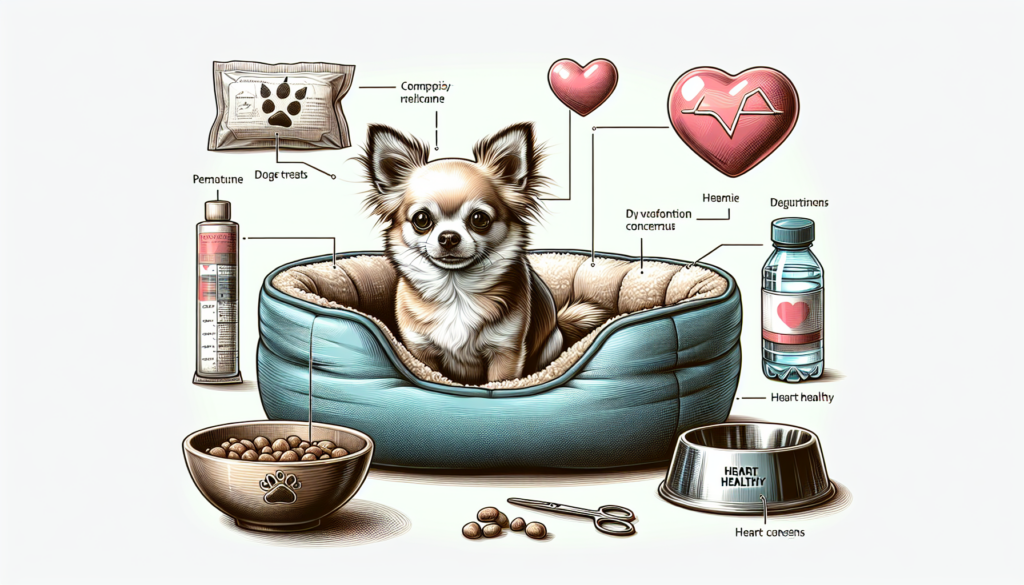Picture this: you’re the proud owner of an adorable Chihuahua, the smallest dog breed in the world. These pint-sized pups are known for their big personalities, but unfortunately, they also have their fair share of health issues to contend with. From dental problems to heart conditions, it’s important to be aware of the common health issues that can affect your furry friend. In this article, we’ll explore some of the key health concerns that Chihuahuas are prone to, so you can ensure your four-legged companion stays happy and healthy for years to come.
Chihuahua Common Health Issues
Chihuahuas are delightful and lovable dogs, but like any breed, they can be prone to certain health issues. Being aware of these common health problems can help you provide the best care for your furry friend. Here are some of the most common health issues that Chihuahuas face:

Dental Problems
Chihuahuas are known for their tiny mouths, which can make dental issues more prominent. They are prone to dental diseases such as gum inflammation, tooth decay, and even tooth loss. Regular dental care is essential for Chihuahuas, including daily brushing of their teeth and annual dental check-ups with a veterinarian. Providing them with dental-friendly toys and treats can also help maintain good oral hygiene.
Heart Conditions
Chihuahuas have a high risk of developing heart conditions, particularly heart murmurs and congenital heart diseases. It is important to monitor their heart health regularly and seek veterinary advice if you notice any symptoms such as coughing, difficulty breathing, or weakness. Early detection and appropriate treatment can significantly improve their quality of life.
Respiratory Issues
Due to their small size and unique facial structure, Chihuahuas can experience respiratory problems. They are prone to conditions like collapsing trachea and bronchitis, which can cause coughing, wheezing, and difficulty breathing. Providing a smoke-free environment and avoiding extreme temperatures can help reduce the risk of respiratory issues in your Chihuahua. Regular exercise to maintain a healthy weight is also beneficial.
Luxating Patella
Luxating patella, also known as a dislocated kneecap, is a common orthopedic issue among Chihuahuas. It occurs when the kneecap moves out of its normal position, causing pain and lameness in the affected leg. Obesity and genetic factors can contribute to this condition. If you notice your Chihuahua limping or favoring a leg, it is crucial to consult a veterinarian for a proper diagnosis and treatment plan.

Hypoglycemia
Chihuahuas have a high metabolism and need regular meals to maintain their blood sugar levels. Hypoglycemia, or low blood sugar, is a common issue in this breed. It can lead to weakness, seizures, and even coma if not properly managed. Frequent, small meals throughout the day and easily digestible food are recommended for Chihuahuas to prevent hypoglycemia. If you suspect your Chihuahua is experiencing low blood sugar, seek immediate veterinary attention.
Eye Problems
Chihuahuas are prone to various eye problems, including cataracts, corneal ulcers, and dry eye syndrome. Their large, round eyes are more exposed to external irritants and injuries. Regular eye examinations and proper care are vital to maintain their eye health. Keeping their eyes clean, using veterinarian-approved eye drops, and protecting them from harsh environments can help prevent or manage eye conditions in Chihuahuas.
Skin Allergies
Chihuahuas can develop skin allergies, often caused by environmental factors or food sensitivities. Allergic reactions can lead to itching, redness, and skin infections. Regular grooming, including baths with hypoallergenic shampoos, can alleviate skin issues. Your veterinarian may recommend dietary changes or prescribe medications to manage allergies.
Collapsed Trachea
The trachea, or windpipe, of a Chihuahua can be weak and prone to collapsing. This can cause coughing, gagging, and difficulty breathing. Collapsed trachea is often observed in older Chihuahuas or those with obesity. Avoiding exposure to smoke, using a harness instead of a collar, and maintaining a healthy weight can minimize the risk of tracheal collapse. Consult your veterinarian for appropriate management and treatment options.
Obesity
Obesity is a significant health concern for Chihuahuas. Their small frames are not designed to carry excess weight, and obesity can lead to various health problems, including joint issues, heart disease, and diabetes. Ensure your Chihuahua receives a balanced diet with appropriate portion sizes and engage them in regular exercise tailored to their size and capabilities. Regular weigh-ins and health monitoring are crucial to prevent and manage obesity in Chihuahuas.
Ear Infections
Chihuahuas are prone to ear infections due to their upright and narrow ear canals. Moisture, bacteria, and yeast can easily become trapped, leading to inflammation and discomfort. Regular ear checks, gentle cleaning with veterinarian-approved solutions, and keeping the ears dry can help prevent infections. If your Chihuahua displays signs of discomfort, such as scratching or shaking their head, seek veterinary attention promptly to avoid complications.
Being a responsible Chihuahua owner means being proactive about their health. Regular veterinary check-ups, proper nutrition, dental care, and monitoring their overall well-being are crucial to keep your Chihuahua happy and healthy. By understanding and addressing these common health issues, you can ensure your Chihuahua lives a long, fulfilling life by your side.
